Benefits of upgrading to the Pega 7 Platform
Upgrading to the Pega 7 Platform adds a unique set of capabilities that make your organization more agile and future-ready. You can provide end-to-end customer experiences by integrating, automating, and improving complex front and back office business operations in a much faster and scalable way. Superior customer engagement is the result of applications that leverage big data, historical data, and event streams; adapt to the business context in which they operate; provide elegant and intuitive user interface across all channels; support dynamic case management capabilities; and enable better business-IT collaboration.
Highlights of the Pega 7 Platform
The new Pega 7 Platform offers features that can engage your application users on various levels. Experience the following advantages when you upgrade to the latest version:
- Easily adaptable applications to engage more users through more channels and harness the power of big data analytics.
- Easier application enhancements and maintenance.
- Improved business agility through enhanced system development speed and accuracy in the three most critical and generally time-consuming areas: getting the requirements right, getting the user experience right, and getting the data right.
- For IT organizations, reduced application operating costs with tools to proactively manage their applications and robust infrastructure to eliminate unplanned downtime.
- A high-performance platform that helps to reduce costs.
The following table highlights new and enhanced features in the latest version.
| Capability | Pega 5.x | Pega 6.3 | The Pega 7 Platform |
|---|---|---|---|
| Omni-Channel UX | No | Yes | Enhanced |
Pega Mobile Web | No | No | Yes |
Pega Mobile Client | No | Yes | Enhanced |
Pega Mobile Mashup | No | No | Yes |
Pega Mobile Device Management | No | No | Yes |
| Pega Pulse social collaboration | No | Yes | Yes |
| Pega Co-Browse | No | No | Yes |
| CPM Composites | No | Yes | Yes |
| Interaction Display Option | No | Yes | Yes |
| Express History | No | Yes | Yes |
| Unified CPM Dashboard | No | Yes | Yes |
| Predictive and adaptive analytics | No | Yes | Enhanced |
| Decision Manager Portal | No | No | Yes |
| Federated Case Management | No | No | Yes |
| Case Lifecycle Management | No | No | Yes |
| Ad hoc case dashboard | No | Yes | Enhanced |
| Live UI | No | No | Yes |
| Pega Live Data | No | No | Yes |
| Data Explorer | No | No | Yes |
| Data Visualizer | No | No | Yes |
| SAML SSO | No | No | Yes |
| REST Integration Wizard | No | No | Yes |
| Process Extender for SAP | No | No | Yes |
| Process Extender for Salesforce.com | No | No | Yes |
| Smart Process shapes | No | No | Yes |
| Auto-complete | No | No | Yes |
| Attachment step type | No | No | Yes |
| Designer Studio cross-browser | No | No | Yes |
| Application Explorer-pinned classes | No | No | Yes |
| Elasticsearch | No | No | Yes |
| Update reversibility | No | No | Yes |
| Rule deprecation | No | No | Yes |
| Zero-disruption architecture | No | No | Yes |
| Guardrail reports | No | No | Yes |
| Predictive Diagnostic Cloud | No | No | Yes |
| Security Access Manager | No | No | Yes |
| Massively scalable batch operations | No | No | Yes |
World of possibilities
Many existing Pega 7 Platform applications were created when smart mobile devices and social computing did not yet exist or were in their infancy. Today, these technologies and the data that they produce create opportunities to enhance the value of these Pega 7 Platform applications.
The Pega 7 Platform offers its customers a broad range of new and improved features that enhance the capabilities of deployed systems, reduce the ongoing cost of operations, and reduce the time to deploy new projects.
Engage more users through more channels
The rapid proliferation of mobile devices and social channels creates opportunities for companies to better serve customers and empower employees wherever they go. More and more, consumers take mobile access as a given. And with social networking technology, they are empowered to complain publicly if they do not get what they want. This empowered customer is changing the marketing and service landscape for all consumer-facing organizations. Even the world’s top brands have been challenged to keep up with the fast pace of change. More than one billion customers engage with the Global 500 on social media, but Maritz Research shows that 70 percent of customer queries and complaints through this channel go unanswered.
Serving users on mobile devices compounds this challenge. Current industry practice is to build seven versions on a minimum of five platforms, such as for example, a Web App, Mobile Web App, iPad App, iPhone App, Android App, BlackBerry App, and Windows Phone App. These channel-specific applications limit reuse and create a fragmented experience for customers and users. They also make it hard for your organization to interact with customers to understand their needs and solve their problems.
Recognizing these challenges, the Pega 7 Platform introduced Omni-Channel UX to open applications to mobile and social channels. The Omni-Channel UX “design-once, access anywhere” user experience delivers consistent, attractive, and intuitive user experiences across all types of devices.
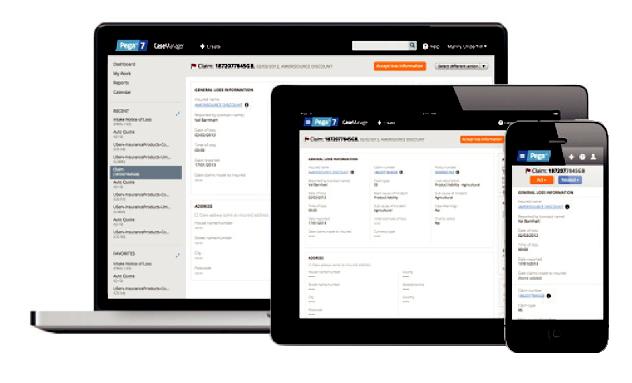
Design-once, access anywhere, the Pega 7 Platform Omni-Channel UX reduces the cost of mobile and social application development
In the Pega 7 Platform, you create your UI design once, deploy on any device, in any locale, in any browser. No coding is required: the Pega 7 Platform automatically generates the details—the semantics specific to browser and device environments, such as mouse-oriented or touch-oriented features that are automatically selected depending on the device. This means that you and your customers can get projects done faster, at lower cost, and with greater agility to respond to changes in the future, including the addition of new interfaces and channels.
The Pega 7 Platform supports three types of mobile experiences—Mobile Web, Pega Mobile Client, and Pega Mobile Mashup within the Pega 7 Platform.
- Mobile Web provides users with an optimized web browser experience regardless of device and screen size. It makes it easy to mobile-enable existing applications without having to develop in separate tools.
- Pega Mobile Client allows organizations to create a branded Pega 7 Platform-based mobile application that is distributed through an app store. This approach provides offline operations for use in places without network connectivity as well as access to mobile device-specific features, such as the camera and signature capture.
- Pega Mobile Mashup provides a way for organizations to take components of a Pega 7 Platform application and embed them in an existing, native mobile application.
The Pega 7 Platform also has the tools you need to manage access to these applications. The Pega 7 Platform supports Smart App Banners as a way to notify mobile web users of the availability of a native version of the application without requiring them to visit an app store. Organizations can also distribute native applications through the Pega 7 Platform Mobile Device Management capabilities. These tools can be used to push applications and application updates to Pega Mobile Client and other mobile apps.
Enable social collaboration in the workplace
Half of all information workers today use social collaboration tools to share documents. They also use these tools to communicate with customers and find experts or information inside their companies. It makes sense, because they use these incredibly intuitive tools in their personal lives. It is natural then that your employees use these tools as well to help get their work done in the office.
The problem is that this type of collaboration goes on without the security, control, or auditing of managed business processes. You cannot simply stop people from using social tools. But, social tools—disconnected from the work being managed—cannot be trusted to get the job done. And, social collaboration with customers cannot be audited later to examine what happened if something goes wrong.
Pega Pulse is a social collaboration tool that integrates the online conversations of employees, partners, and customers into the work being done. Fully integrated in the Pega 7 Platform environment, Pega Pulse gives users the tools to chat easily with colleagues. In addition, users can advance a process or resolve a case directly from their conversation feeds, and even incorporate conversations from external social media networks. And, because they are doing this in the context of a Pega 7 Platform application, all their discussions become part of the case history so that everything is in one place for later review or audit.
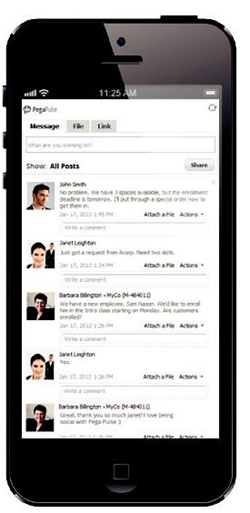
Pega Pulse social collaboration delivers the social experience within the workplace with security and control.
Provide secure, interactive online support
A key part of servicing customer requests over the web is guiding customers to the products that they need or assisting them with submitting information online. Web page co-browsing is an excellent way to provide this level of service, but the proliferation of devices, form-factors, and browsers appear to be daunting hurdles to overcome. Pega Co-Browse provides a way to offer live, interactive, and secure support on your website without stumbling on any of these hurdles. Pega Co-Browse supports both desktop and mobile devices—regardless of form-factor—without the customer needing to download any software. With Pega Co-Browse, your customer service representatives can provide the guided assistance your customers need in a highly secure way because Pega Co-Browse prevents even your employees from seeing your customers’ confidential information.
Improve the service experience with customer process manager enhancements
In Customer Process Manager (CPM) 6.3, the Pega 7 Platform introduced end-user experience improvements to help CSRs save steps and operate more efficiently, reducing average handling time and training costs. In addition, CPM 6.3 introduced CPM Composites, an improved screen layout for CSRs that provides pertinent customer information. The Interaction Display Option gives two options for displaying the CSR’s interaction panel. It can be displayed as an overlay or as a modal window. This means that multiple actions can be completed at once. CPM 6.3 also added an Express History feature that can create a tracking note to log an auditable interaction with the customer, such as sharing payment amount due or account balance information.
The new Unified CPM Dashboard has a standardized dashboard across CSR and supervisor portals. The dashboard displays distinct graphs based on the user type. The dashboard includes a work-centric view that has improved sorting and filtering of as well as search for work items.
Enhance applications with big data analytics that business people can use
Today’s big data resources and advanced analytics create tremendous opportunity to more meaningfully engage customers with personalized service and offers that anticipate their needs. However, the fast growth of data and a shortage of data scientists to make sense of big data make it difficult and expensive to harness its power. Simply put, companies struggle because they cannot access the data, they cannot make sense of it, and they cannot use it when they need it most—at the point of customer interaction.
According to Forrester, these are the inhibitors to improving sales, customer satisfaction, and retention:
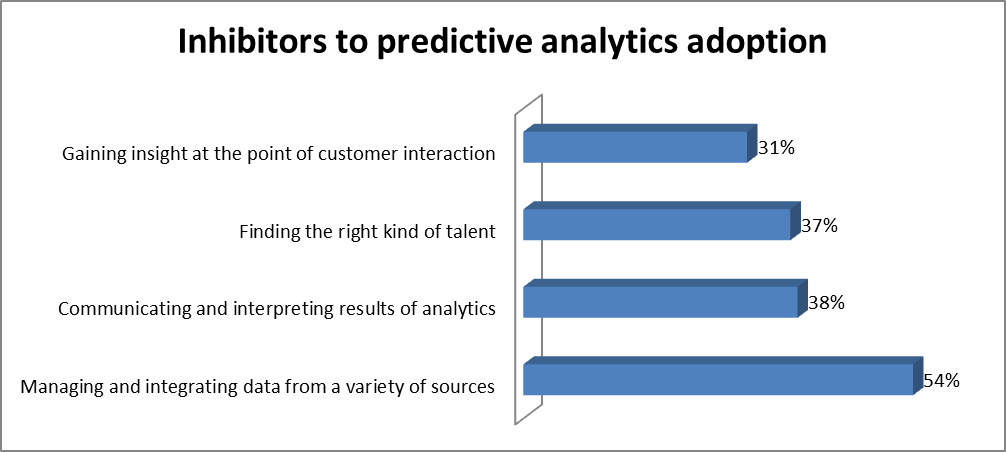
Inhibitors to predictive analytics adoption
The Pega 7 Platform has integrated its powerful predictive and adaptive analytics capabilities directly into Designer Studio. As a result, business people now have the ability to use sophisticated analytics without lengthy training and specialized expertise. Furthermore, these capabilities come with lifecycle governance capabilities that make it easy for business users to set up, create trial simulations, deploy, and roll back changes in a way that is appropriately authorized and controlled. This means that business users can test and deploy strategies without disrupting any ongoing business or IT operations.
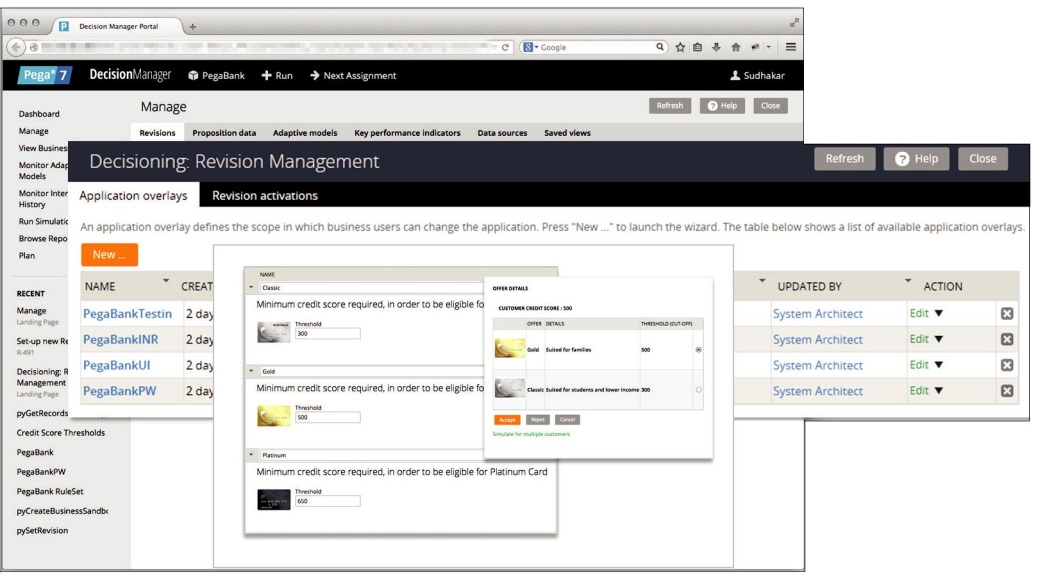
The Pega 7 Platform’s Decision Revision Management provides easy-to-use tools that enable business users to manage change with automation and proper governance
Gain visibility with federated case management
Federated case management in the Pega 7 Platform provides organizations with a way to manage cases and processes across multiple, independent applications, while preserving their autonomy, governance, and security. For example, customer service organizations can have a complete view into all of a customer’s outstanding issues across multiple Pega 7 Platform applications, gaining complete process visibility and reporting. Customer service representatives answer all of the customer’s questions and provide higher quality service.
Deliver new capabilities faster
Pegasystems' customers know well the business agility benefits to be gained with the unified Pega 7 Platform in today’s rapidly changing business environment. The Pega 7 Platform further improves business agility by enhancing system development speed and accuracy in the three most critical and generally time-consuming areas: getting the requirements right, getting the user experience right, and getting the data right.
Getting the requirements right
According to IAG Consulting research, up to 70 percent of IT projects resulted in a marginal outcome or failure.
The top reason was that the requirements and results did not mesh. Pegasystems customers know how DCO (Direct Capture of Objectives) helps them avoid failure by directly converting modeled requirements into finished applications without the usual time-consuming and error-prone process of hand coding.
The Pega 7 Platform has improved DCO capabilities by making Case Lifecycle Management the design center of the product, and by furnishing visual tools that facilitate the accurate capture, realization, and evolution of the full scope of work. It uses a visual language that everyone—business executives, subject matter experts, and IT practitioners—can readily understand. Case Lifecycle Management gives business users a way to define the steps of how work gets done by defining aspects of the “case,” as a set of workflows that needs to be accomplished and a definition of a desired outcome. A case, for example, defines how a bank’s customer-service operations handle a lost credit card or how a health plan cares for a client with a chronic condition such as diabetes.
Case Lifecycle Management provides a way to capture all of the important information about a business process without getting lost or bogged down in the capture of all the details contained in a Business Process Management Notation (BPMN) definition of processes and transactions. Those details are important as well, but they are captured within the context of the high-level case definition, and can be elaborated over time once the high-level case lifecycle is understood. In addition, the Pega 7 Platform Case Lifecycle Management provides the freedom for designers to make changes to the high-level design at any time during the development of a project. Because the high-level design is part of the model, the design and the finished application are always kept in sync.
Case stages are captured within the application documentation, which provides a complete view and understanding of case behavior. The inclusion of Case Lifecycle Management in DCO contributes significantly to these gains because it makes it easy to capture and document the case management requirements of an application.
Another development in the Pega 7 Platform’s dynamic case management capabilities is the addition of an Ad Hoc Case Dashboard. The Ad Hoc Case Dashboard makes it possible to create a new ad hoc case to flexibly organize and facilitate work that is unplanned and unstructured. It is easy to create an ad hoc case, create a task list (with assignments, status, and deadlines), attach content to the case to keep it organized, and optionally configure the ad hoc case for reuse.
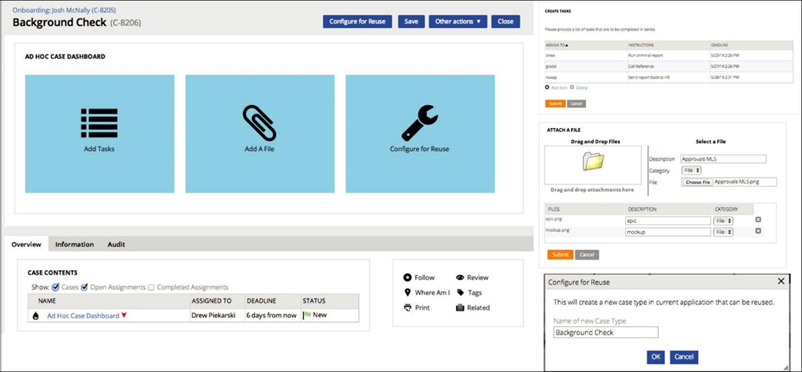
The Ad Hoc Case Dashboard is the starting point for creating a new ad hoc case and flexibly organizing and facilitating work that is unplanned and unstructured
Regardless of whether an ad hoc case is created from “My Cases,” Pega Pulse, or a local flow action, they all call the same functions and rules and create the same ad hoc cases. With this new capability, users have a unified way to add new tasks to work already in process, make changes in the way a case is being handled, or even draw new business processes as needed. This speeds up the resolution of work, while reuse allows organizations to quickly promote best practices across the organization.
Getting the user experience right
A critical component for the successful adoption of an application is getting the user experience right. This requires creating easy-to-use interfaces, incorporating feedback, and revising as needed to ensure users can work efficiently and effectively with minimal training.
As noted earlier, in the Pega 7 Platform, you create the UI once and deploy it on any device, in any locale, in any browser—all without coding. For developers, this saves considerable time and effort and it works across all three mobile experiences, Mobile Web, Pega Mobile Client, and Pega Mobile Mashup.
How much development time does having all of this functionality in the Pega 7 Platform and accessible through the Designer Studio save organizations? When Cap Gemini performed its productivity study on the Pega 7 Platform mobile development capabilities, it found development was 40 times faster than traditional coding techniques. (The study did not even include the Pega Mobile Client and Mobile Mashup capabilities, because they were not available at the time.)
Live UI, another design-time enhancement, allows business stakeholders and developers to collaborate on the user experience interactively from within a running application. With Live UI, the team can adjust layouts (for example, 3-column to 2-column), UI controls (for example, change a link to a button with text), styling (for example, button color), mandatory/non-mandatory field behavior, and field labeling. This enhancement speeds development by allowing adjustment to user screens during DCO sessions for immediate feedback. Built-in governance features control the migration of these changes to production.
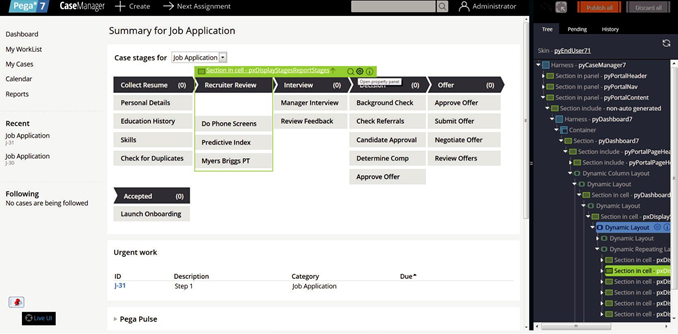
Live UI makes it easy to refine a UI design from within a running application
Getting the data right
A key component of efficient application development is getting the data model right the first time. According to Aberdeen Research, up to 40 percent of the time spent on an IT project is on integration.
The Pega 7 Platform introduces Pega Live Data, a data integration and management facility that addresses this issue. Pega Live Data simplifies the use of data in processes in the following ways:
- Through declarative rules, it automatically fetches data from systems of record as needed in processes and screens. This means that your processes are not cluttered by work related to the retrieval and preparation of data. A new Data Explorer makes it easier to incorporate data into applications.
- It is much easier to set up the flow of data among clipboard/cases, data pages, and connectors/services.
- The Pega 7 Platform now has the concept of nested data pages, which makes it easier to separate application-specific data management from cross-application data management, making reuse easier.
- The new Data Visualizer provides an interactive way to explore data relationships through an entity relationship diagram-like visualization that shows the relationships among classes that are established by page (object) and page list (object array) properties. Any Pega 7 Platform class displays if it is connected to a data type, including case types and data types. Developers now have an intuitive way to see how data fits into an application. This makes it easier and faster for developers to use the data and modify the application.
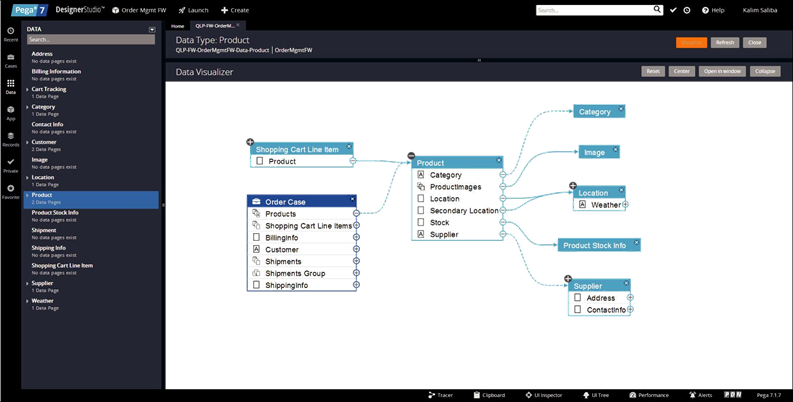
The Pega 7 Platform Data Visualizer is a central tool for viewing and editing data types and system-of-record instances. Developers are more productive because they can now model all data in a single context
Easier third-party application and service integration
The Pega 7 Platform's new REST integration wizard saves developers considerable time by providing a tool that automatically integrates a REST service into the Pega 7 Platform data page. Furthermore, after this data page has been created, any subsequent team members working on the application do not need to know the details of how the integration was done.
With the most recent updates to the Pega 7 Platform, Pegasystems has introduced SAML SSO to the product, making it easy to provide full SAML 2.0 Single Sign On regardless of whether the application is on the premises or running in Pega Cloud. This new capability saves the developer the time and effort of writing custom Java code to integrate the Pega 7 Platform with enterprise identity management systems.
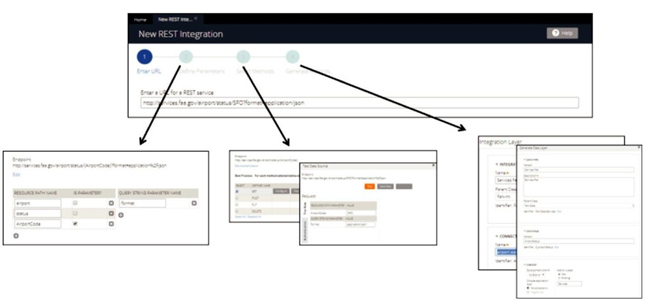
REST integration wizard integrates REST services into the Pega 7 Platform Data Page, making the service available to other developers
Deeper integration with SAP and Salesforce.com
Process Extender for SAP and Process Extender for Salesforce.com are two solutions that run on the Pega 7 Platform to help extend the value of your SAP and Salesforce.com investments.
Pegasystems has developed the Process Extenders for SAP and Salesforce.com to close the execution gaps associated with each platform:
- SAP application owners who are frustrated by the limitations of SAP to handle sales, service, or other functions that tend to be highly customized are able to better leverage their existing SAP installations in conjunction with the Pega 7 Platform for process management. The Process Extender for SAP handles client-specific or fast-changing business requirements, which are poorly served by SAP standard CRM and ERP applications.
- The Process Extender for Salesforce.com does more than track just sales opportunity information. It ensures fulfillment of deals once they are closed, which helps you keep the business you just won. Salesforce.com sales and service users who want to deepen their visibility and control of fulfillment can leverage the Pega 7 Platform in conjunction with Salesforce.com applications to do just that.
Improved developer productivity
Throughout the Pega 7 Platform, numerous additional enhancements help organizations complete projects on time and under budget.
Smart Process Shapes give designers a way to quickly add common process functions to a process. For example, a Smart Process Shape can define a step such as sending an email, creating or updating a case, or posting to a social feed. The benefits include fast reuse of common components as well as regulatory compliance for key processes that require specific, repeatable steps.
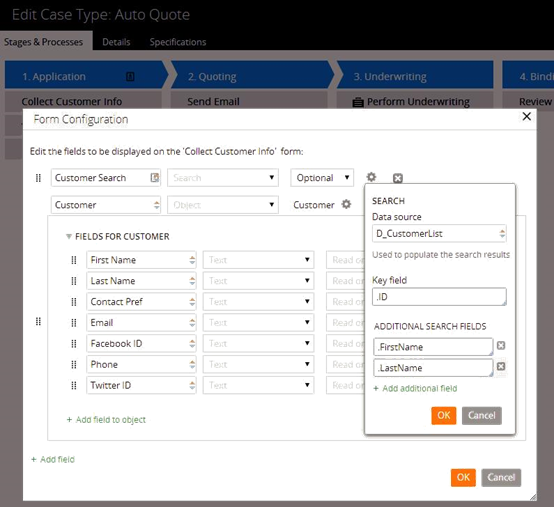
Auto search makes it easy to configure auto-completing search fields in your Pega 7 Platform application
The Pega 7 Platform also supports auto-completion so that developers can easily configure search fields during high-level case design. Search of Rule-, Data-, and Work- is now much faster.
When working in the Case Designer, business users and developers can now include an “add attachment” case step. In line with developing applications based on the way that business people think, this capability is a natural fit for the way people want to complete a task. In keeping with the Pega 7 Platform goals of making things easy for developers, this attachment step type automatically takes mobile devices into account by prompting the mobile user to attach or take a photo.
The enhanced Designer Studio is now 100 percent cross-browser compatible, allowing developers to use their browser of choice without compromising functionality. Pegasystems consultants working at customer sites have found Designer Studio to perform better in Google Chrome, increasing their productivity. For power developers, the Pega 7 Platform has added the ability to pin the most commonly used classes to the Application Explorer so that they are easier and faster to find.
The Pega 7 Platform also has an improved search capability, called Elasticsearch, which provides faster and more reliable full-text search across Rule-, Data-, and Work- instances.
Another new time and effort saver in the Pega 7 Platform is update reversibility. This feature provides an automated way to roll back an update of the Pega 7 Platform software. For developers, this means that they can explore how an update affects an application without having to create a clone system.
The Pega 7 Platform has a new rule deprecation feature that allows developers to remove rules without deleting them so that they do not accidently reuse outdated assets.
Reduce ongoing application operating costs
IT organizations that want to reduce their ongoing application operating costs need tools to proactively manage their applications and robust infrastructure to eliminate unplanned downtime. They need easier-to-use tools and a way to build applications that avoids future issues that can affect upgrades. The Pega 7 Platform delivers capabilities to meet all of these requirements.
Improved application availability and uptime
According to a CA Technologies survey of 200 enterprises, downtime resulted in an estimated $26.5 billion in lost revenue every year. The Zero-Disruption Architecture introduced in the Pega 7 Platform not only protects the organization from downtime associated with unplanned events (hardware, software, and network failures), it eliminates the need for planned downtime. With this capability, organizations can manage and implement maintenance and system updates without sacrificing end-user productivity.
The Pega 7 Platform Predictive Diagnostic Cloud service introduced with the latest release helps customers identify and correct system health problems. These tools augment traditional application performance management solutions by focusing on issues that are specifically related to the speed and reliability of the Pega 7 Platform applications and help you address issues before they become problems. Pegasystems has put this solution in the cloud specifically to help you focus on improving your Pega 7 Platform applications without having one more application to worry about.
Improved development and operations
The improved Guardrail reports make specific recommendations when developers make choices that affect performance or upgradability. The reports and dashboards make recommendations to bring design choices back into compliance. The Pega 7 Platform can also send development team members an email that details Guardrail compliance scores and warnings in an easy-to-read format. The result is better application quality, reduced go-live time, and the ability to avoid the cost and delay of remediating non-compliant applications ahead of future upgrades.
In addition, the Pega 7 Platform Security Access Manager centralizes security in a way that makes it easy to visualize user group authorization to features and data within an application. This new approach simplifies security deployment, management, and issue resolution.
Highly scalable batch operations
The Pega 7 Platform has made it possible to perform more transactions per unit of hardware through new massively scalable batch operations. These offline, batched activities include Next-Best-Action campaign calculations, end-of-day transaction reconciliation, and fraud analysis. This enables enterprises to save on hardware costs.
Proven benefits
Several customers have upgraded their applications, and achieved greater results in their respective domains. The following list describes some of the success stories:
- Using the Pega 7 Platform’s new mobile capabilities, Australian insurer QBE’s upgrade to the Pega 7 Platform helps its underwriters get work done while on the road.
- Rabobank upgraded from PRPC 6.3 to the Pega 7 Platform, and now can take self-service loan applications through a desktop web browser or from a mobile device for any of its 129 member banks in 47 countries.
- For a European revenue collection firm, the new CPM user interface capabilities have met with great response from the end-user community. According to one business lead on the project, “The reaction has been very positive. People like the new system, particularly the look and feel.”
- A large telecommunications company has implemented the Pega 7 Platform for its call center and retail store-guided interactions to help retain customers who want to cancel a line or an account. As a result, customer service representatives are delivering the right retention offers to customers consistently and confidently.
- HSBC upgraded to the Pega 7 Platform earlier this year to gain the benefits of federated case management, which enables an orchestration layer that spans multiple applications that make up HSBC’s global banking and markets client lifecycle management solution.
- Cap Gemini found in its productivity study of the Pega 7 Platform that Direct Capture of Objectives (DCO) is 8 times faster than traditional application requirements capture methods. A large global bank has seen Case Lifecycle Management and DCO speed development. These capabilities have helped the scrum team develop several sprints quickly, and the bank plans to go live at the end of the fifth sprint.
- A large, global financial services company has found the development of the user interface development to be faster and to allow more user interface capabilities. At another customer site, Pegasystems consultants recorded a 20% reduction in user interface development time.
- The new data management capabilities have reduced development time for one European financial services firm by 10%.
- A large retail and healthcare company uses the Process Extender for Salesforce.com to deliver the case management capabilities needed to fulfill orders after the sales process. The Process Extender lowers costs for CVS Caremark by reducing paper forms and manual notifications, creating visibility and transparency into implementation progress and monitoring process performance against metrics.
- A European tax collection agency found the Pega 7 Platform security testing to be much faster because the Pega 7 Platform is much easier to secure.
Conclusion
With the Pega 7 Platform, organizations can more effectively engage customers and users with more sophisticated, yet simpler-to-deploy user experiences across devices and channels. Designing and building these applications is more efficient with new capabilities such as Case Lifecycle Management and Pega Live Data. Operations are also run more smoothly on the Pega 7 Platform, with fewer disruptions and better utilization of resources. Enterprises running earlier versions of PRPC and CPM can see tangible benefits from upgrading because they are able to respond more quickly and effectively to new market opportunities, increase operational efficiencies, and gain exceptional business agility with faster, more cost-effective application development.
